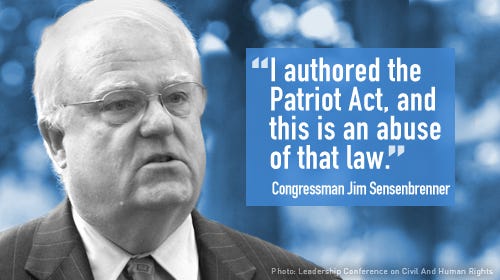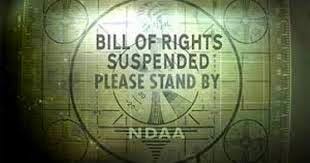What you're not being told about the USA Freedom Act

The current “gutted” version of the U.S.A. Freedom Act (S. 2685) will only serve to legalize government’s currently illegal surveillance of innocent civilians. A coalition of whistleblowers & civil liberties organizations published a letter calling on members of Congress to reject the empty reform.
Please click here & add your name to the letter & please contact your local representative to voice your opposition to its passage.
“Governmental security agencies’ zeal for collecting Americans’ personal information without regard for cost, efficacy, legality, or public support necessitates that Congress act to protect the rights of residents across the United States and around the globe,” writes the group under the banner of the OffNow campaign. The letter is signed by a number of intelligence community whistleblowers, including Thomas Drake and Daniel Ellsburg, as well as over 15 publications and organizations, such as RootsAction.org, CREDO Action, Fight for the Future, Restore the Fourth and the Sunlight Foundation.
The U.S.A. Freedom Act, they charge, “is not the substantive reform originally envisioned and supported by the public” after it was introduced to both houses by Senator Patrick Leahy (D-Vt.) and Rep. Jim Sensenbrenner (R-Wis.) in October 2013. In late May, H.R 3361 passed the House of Representatives—after being heavily marked up by the House Judiciary subcommittee—and moved on to the Senate where it has languished in the Senate Judiciary subcommittee.
In its current form, the group says that the legislation now threatens to embolden the same violations it alleges to deter and has numerous ambiguities which make it “ripe for abuse.”
<a href="http://us-ads.openx.net/w/1.0/rc?cs=740a723830&cb=INSERT_RANDOM_NUMBER_HERE" ><img src="http://us-ads.openx.net/w/1.0/ai?auid=536880831&cs=740a723830&cb=INSERT_RANDOM_NUMBER_HERE" border="0" alt=""></a>
The Act, they write, “legalizes currently illegal surveillance activities, grants immunity to corporations that collaborate to violate privacy rights, reauthorizes the PATRIOT Act for an additional 2.5 years, and fails to reform EO 12333 or Section 702, other authorities used to collect large amounts of information on Americans.”

I am an original cosponsor of the Freedom Act, and I was involved in its drafting. At its best, the Freedom Act would have reined in the government’s unconstitutional domestic spying programs, ended the indiscriminate collection of Americans’ private records, and made the secret FISA court function more like a real court—with real arguments and real adversaries.
I was and am proud of the work our group, led by Rep. Jim Sensenbrenner, did to promote this legislation, as originally drafted.
However, the revised bill that makes its way to the House floor this morning doesn’t look much like the Freedom Act.
This morning’s bill maintains and codifies a large-scale, unconstitutional domestic spying program.
It claims to end “bulk collection” of Americans’ data only in a very technical sense: The bill prohibits the government from, for example, ordering a telephone company to turn over all its call records every day.
But the bill was so weakened in behind-the-scenes negotiations over the last week that the government still can order—without probable cause—a telephone company to turn over all call records for “area code 616″ or for “phone calls made east of the Mississippi.” The bill green-lights the government’s massive data collection activities that sweep up Americans’ records in violation of the Fourth Amendment. – Honorable Justin Amash
Sean Vitka, federal policy manager for the Sunlight Foundation writes in a blog post that despite its meager reforms, the legislation has “extraordinary potential to create a misleading view of what is going on behind closed doors and in secret courts.”
“The Intelligence Community’s past approach to ambiguous and weak laws underscore that this one threatens to do more harm than good,” Vitka argues.
http://www.intellihub.com/harm-good-congressional-nsa-reforms-sham-say-critics/
http://www.secretsofthefed.com/congress-guts-usa-freedom-act-favor-mass-spying-americans/
Edward Snowden reveals more govt spying in the U.S. &
New Zealand:
The recent disclosure by Edward Snowden of the US government’s wide net of surveillance has stimulated an emotional debate about security, privacy, and secrecy. We have learned from Snowden that the National Security Agency engages in virtually unchecked monitoring of all sorts of communications that were thought to be private but that we now know are maintained in secret government databases.
Three fundamental issues are raised by these disclosures: Was it proper for the government to conduct such massive surveillance and to maintain such extensive files? Was it proper for the government to keep its surveillance program secret from the public? If not, did this governmental impropriety justify the unlawful disclosure of so much classified information by Snowden?
There are no simple or perfect answers to these questions. All governments, even those that respect the right to privacy, must engage in some surveillance. The nature and extent of permissible intrusion on privacy will always depend on the nature and extent of the threats posed and the value of the information sought in preventing these threats from materializing. A delicate balance must be always struck between security and privacy.
Consider, for example, video surveillance of public areas. Such surveillance helped authorities identify the alleged perpetrators of the Boston Marathon bombings and probably also helps to deter street crime, store thefts, and other threats to the public. And it does so with some, but fairly minimal, intrusions on our privacy, since surveillance cameras capture only our external movements in public places, and not our words or deeds in the privacy of our homes. It is not surprising therefore that few citizens object to this limited sort of public monitoring of our movements.
Contrast such benign intrusions with the far more massive ones revealed by Snowden. We don’t know precisely what sorts of information the NSA has gathered and from whom. (This lack of knowledge in itself is part of the problem.) But we know enough to be concerned that our phone calls, e-mails, and even oral conversations may be subject to governmental monitoring and collecting.
The government denies that it is listening to or reading the content of private communications between ordinary citizens, claiming that the NSA collects only the “metadata,” specifically the identifying features of the persons who are communicating; the times, durations, and locations of such communications; and other “externalities.” The massiveness of such a collection process tells the government a great deal about the substance of terrorist plans. But it also tells the government a great deal about the substance of our private lives. That is why there is so much controversy about a program that gathers so much with so few checks and so little accountability.
https://www.bostonglobe.com/opinion/2014/09/14/dershowitz/nUBlr9N3HmWNSkQEX8OmGJ/story.html
Part 1) How should a democracy decide when to compromise its ideals in pursuit of victory?
Part 2) Snowden case reveals a program with few checks and little accountability
http://www.bostonglobe.com/opinion/2014/09/14/dershowitz/nUBlr9N3HmWNSkQEX8OmGJ/story.html
Part 3) How can US keep terror suspects with no hope of trial, but espouse due process?
http://www.bostonglobe.com/opinion/2014/09/15/should-suspected-terrorists-like-those-held-guantanamo-detained-without-trial/9N2ERaZn75mSSZX67F6rFK/story.html
Part 4) Tactic is here to stay; legal system needs to catch up with military technology
http://www.bostonglobe.com/opinion/2014/09/16/targeted-killings-and-rule-law/hrwkmfwmEZ4kZH7KUJGafL/story.html


